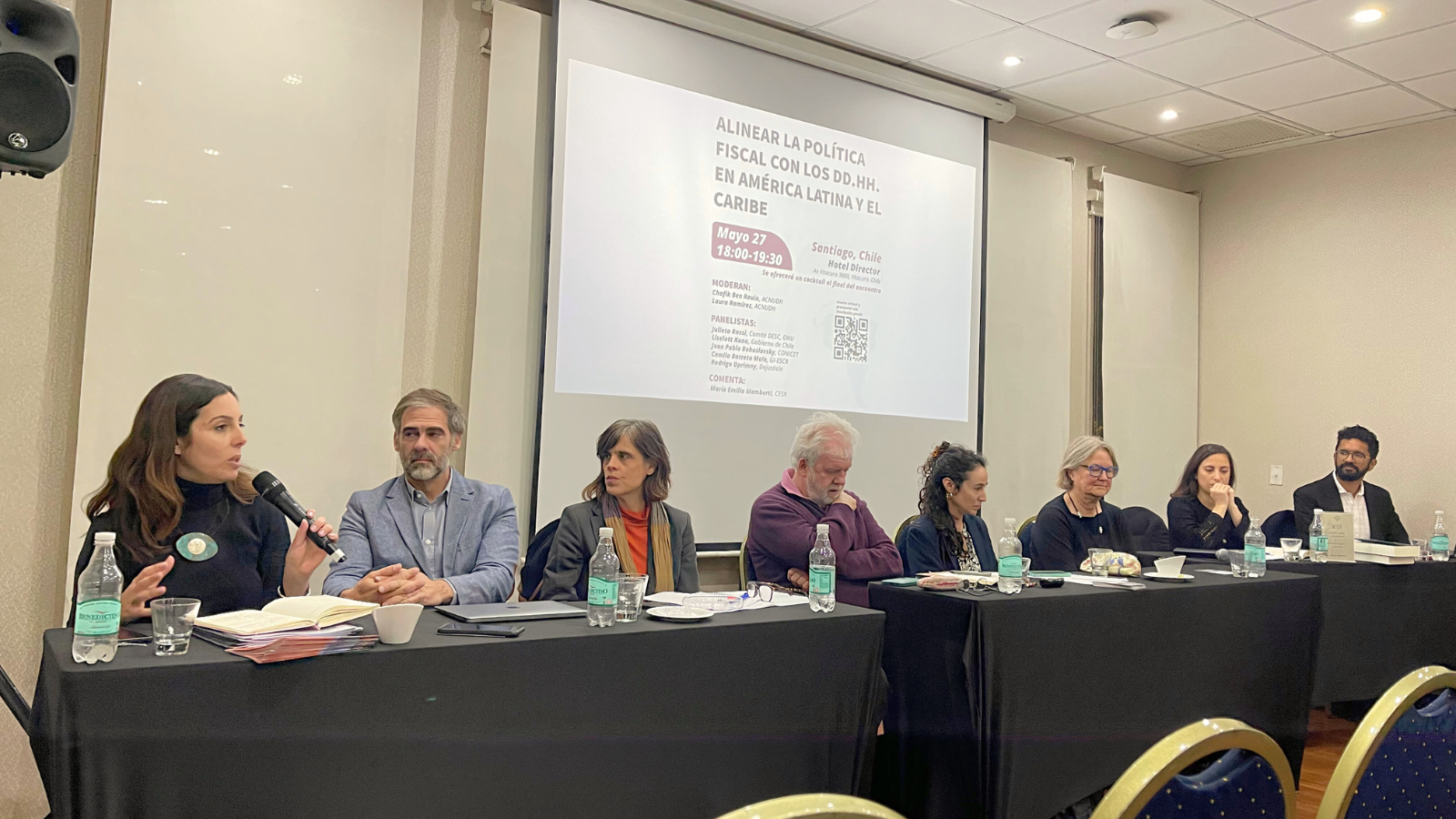As UN negotiations on a global tax convention prepare to resume in August, a high-level dialogue in Santiago made the case for embedding human rights at the heart of fiscal reform in Latin America, the Caribbean and the world.
Government representatives, legal experts and civil society advocates gathered in Santiago, Chile, to advance a shared agenda: placing human rights at the center of tax and fiscal policy in Latin America and the Caribbean and globally.
The event was co-organized by the Office of the United Nations High Commissioner for Human Rights (OHCHR), the Global Initiative for Economic, Social and Cultural Rights (GI-ESCR), the Center for Economic and Social Rights (CESR), and the Initiative for Human Rights in Fiscal Policy. It comes at a key moment: Brazil has just assumed the presidency of the Platform for Taxation in Latin America and the Caribbean (PTLAC), and UN negotiations toward a new Framework Convention on Tax are expected to pick up pace again soon.
Julieta Rossi, member of the UN Committee on Economic, Social and Cultural Rights, speaking in personal capacity, discussed the Committee’s recent statement on tax policy. She explained that regressive tax policies and illicit financial flows are undermining states’ ability to fulfill rights, and reminded participants that “taxation is not only a mechanism to raise revenue—it is a tool to redistribute resources and wealth more fairly, both within and between countries.”
Juan Pablo Bohoslavsky, former UN expert on debt and human rights, warned that debt and austerity are threatening rights and sovereignty across the region. Presenting a new book on debt in the Inter-American system, he argued that “the debt is not just a number—it’s a tool of domination,” and emphasized that budget decisions made in response to debt servicing are not neutral: they shape whose rights are realized and whose are denied. CESR contributed to the volume with a chapter titled “Civil society demands on debt and human rights” (“Demandas de la sociedad civil en materia de deuda y derechos humanos” in the original Spanish ), highlighting how civil society across the region is challenging the dominant narrative on debt and calling for systemic reforms anchored in human rights.
You can relive the event here (in Spanish, closed captions available)
Camila Barreto Maia, Executive Director of GI-ESCR, addressed how the growing invocation of “taxpayer rights” by powerful economic actors is being used to resist reforms aimed at equity and transparency. “The rights being defended under this label,” she said, “are often the rights of the wealthy to stay hidden and avoid contributing.” She underscored that protecting fiscal transparency and democratic oversight is essential for redistributive justice.
Rodrigo Uprimny, senior researcher at Dejusticia, made the case for a tax convention grounded in human rights norms, stressing that “fiscal justice is not a political preference—it’s a legal obligation.” He argued that only by framing global tax cooperation as a human rights imperative can states ensure the resources necessary to realize rights and combat inequality.
To support the dialogue, CESR shared its new Technical note on aligning tax cooperation with human rights in the UN tax convention, which outlines how the emerging framework can reflect states’ legal duties under international human rights law—including principles of equality, non-discrimination, and extraterritorial obligations.
The note argues that grounding tax cooperation in principles such as the obligation to use the maximum of available resources, the duty of international cooperation and assistance, and extraterritorial obligations can help address the structural imbalances and power asymmetries embedded in current tax governance. These principles can help ensure that international tax rules do not undermine states’ ability to deliver on economic and social rights—and instead support the global redistribution of resources essential to tackling inequality and climate injustice.
CESR’s role in the broader fiscal justice movement has focused on bridging human rights with economic policymaking, working closely with partners to transform the norms, metrics and institutions that shape fiscal space. “We see human rights as a framework for rethinking how the global economy is organized,” said our Research and Policy Lead, María Emilia Mamberti. “These are two worlds that have long been talking past each other—but this moment offers a real opportunity to speak together, to build fiscal systems that are more equitable, effective and legitimate because they are grounded in human rights.”
As Brazil leads PTLAC and the UN process moves forward, Latin America and the Caribbean are showing what is possible when fiscal policy is reclaimed as a public good—rooted in justice, shaped by rights, and accountable to people.
